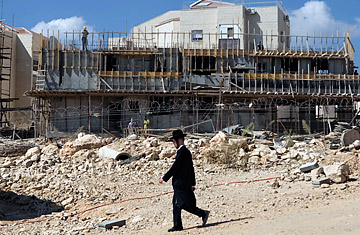
An ultra-Orthodox man walks in front of a construction site in the West Bank Jewish settlement of Beitar Illit, Wednesday, Sept. 15, 2010.
On Sunday, the diesel roar of bulldozers will announce the resumption of construction on Israeli settlements in the ancient terraced hills of the West Bank. In the metaphorical silence said to typically follow a traumatic event, it might just be possible to hear the chair of Mahmoud Abbas scraping the floor as he pushes away from the negotiating table. The president of the Palestinian Authority says he cannot possibly continue talking about a two-state solution with an Israeli government allows the building houses for its own people on the land that's supposed to make up the other state. If Abbas stands by his ultimatum, and Israeli prime minister Benjamin Netanyahu remains true to the promises he made to his right-wing coalition, President Obama's quest for a "framework agreement" between Israelis and Palestinians to divide the land they both claim could end less than a month after it began.
Despite neither side showing any inclination to back down, the dependence of both on American goodwill could nonetheless prevent the threatened breakdown. The reliance of Abbas' administration on aid from U.S.-allied governments helped Washington pressure him to join the talks in the first place, and that same leverage could be brought to bear to keep him at the table.
The famously hawkish Netanyahu may or may not be sincere in his newfound enthusiasm for a two-state solution, which would require Israel leaving most of the territory it captured from Jordan 43 years ago. "You go through the motions," says Benny Begin, a leader of Netanyahu's Likud Party who is part of the Prime Minister's seven-member inner cabinet. They believe, says Begin, that Palestinians are disingenuous about saying they want only part of the land Israel occupies. And besides, he asks, what's the point in negotiating with Abbas when he doesn't even control the Gaza Strip, which is controlled by the militant Hamas movement which has used attacks on Israelis to express its disdain for the peace talks?
Still, "going through the motions" as Begin put it has brought Israel back into favor with its indispensable ally, just when it is urgently pressing Washington to confront Iran over its nuclear program. And if, against long odds, a final peace deal were indeed reached, that should bring the promised formal recognition of Israel by Arab states. That, in turn, might well reduce Iran's growing power in the region, not least by hollowing out the ground beneath its proxies, Hizbollah and Hamas, militias committed to destroying Israel.
Tantalizing as that vision may be, the realities working against it were on vivid display over the past week. In Jerusalem, early Wednesday, a guard for a Jewish settlement located in an Arab neighborhood shot and killed an Arab Israeli. Arab youths rioted for hours in response, burning cars, smashing buses and pelting police with stones. Officers moved into the compound of the Al Aqsa mosque, setting up a cordon to prevent Jewish worshipers from being pelted by rocks at the Western Wall below.
One name that reappeared in the headlines last week after a long absence was that of Jonathan Pollard, the U.S. Navy technician serving a life sentence after being convicted of spying for Israel. Israel Army Radio reported that Israel has approached the Obama Administration with an offer to extend the settlement moratorium in exchange for his release. (The U.S. military and intelligence establishment furiously resisted such a move when Netanyahu proposed it to President Bill Clinton at the Wye River talks in 1998.) And settlers in East Jerusalem have named a building in Pollard's honor. Tightly woven is the fabric of conflict in the Middle East, but for making a mesh of things, it's hard to top the threads that came together on the winding streets of Jerusalem's Silwan neighborhood.
"Everything is related," says Jessica Montell, executive director of B'Tselem, the leading human rights organization in Israel. "There is a sense of dread when you put the pieces together."
Expectations of the current peace talks are so low on both sides that there's little fear that their demise would lead to a new wave of violence, like the Second Intifada that erupted in the wake of the failed 2000 Camp David summit. The past year has been the quietest in memory inside Israel. And then, as Netanyahu flew to Washington to begin the talks, Palestinian gunmen killed four Israeli settlers near Hebron, sending a signal, according to a spokesman for Hamas. The next night brought another attack.
"You've already had an escalation," Montell says. Which brought a crackdown by Israeli forces and the Palestinian Authority that has tightened its hold on the West Bank. No one expects another intifada, she says, but if talks break down, "then the horizon is bleak."
